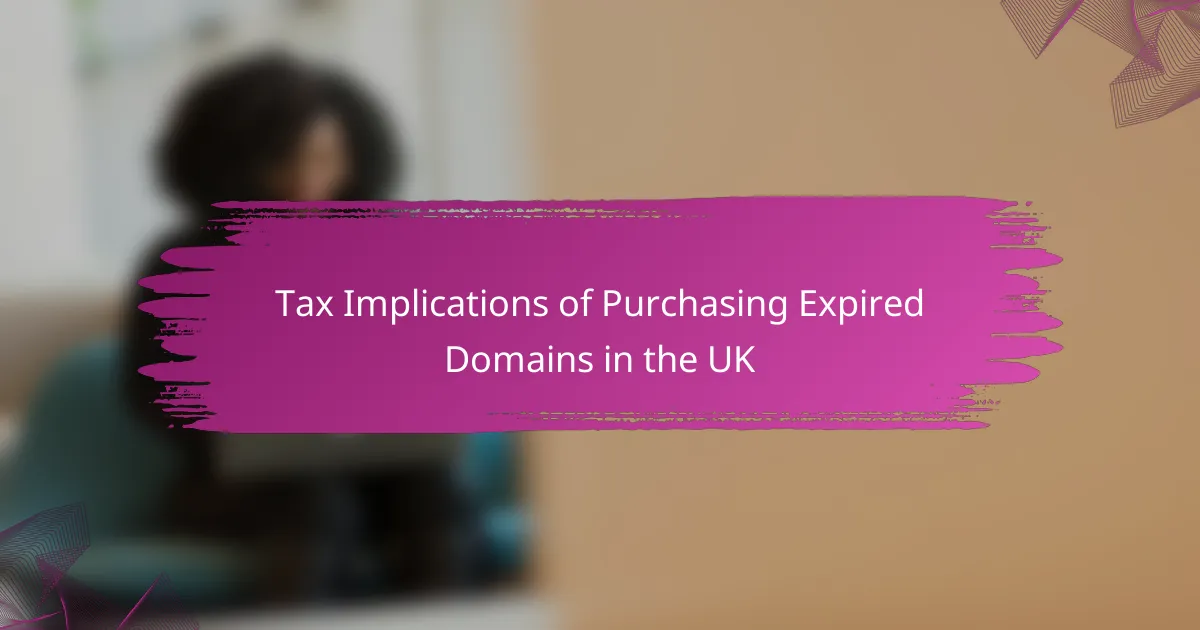Purchasing expired domains in the UK can lead to various tax implications, including potential liabilities for capital gains tax, value-added tax (VAT), and income tax on sales. It is essential for investors and resellers to understand these factors to ensure effective financial planning and compliance with tax regulations.
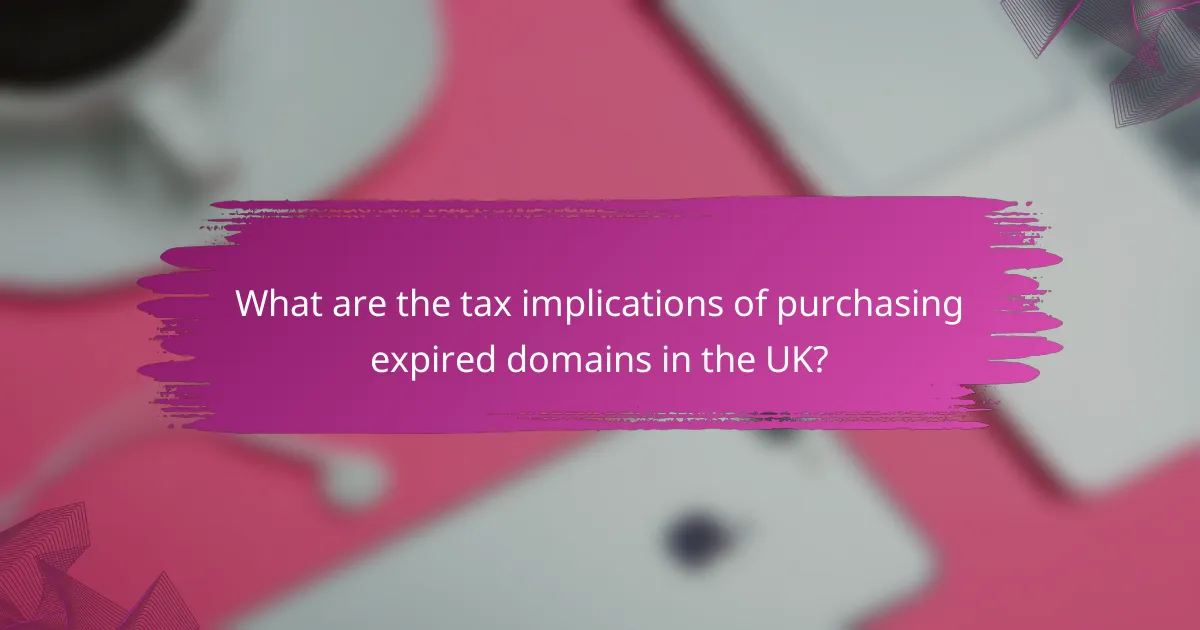
What are the tax implications of purchasing expired domains in the UK?
Purchasing expired domains in the UK can have several tax implications, including potential liabilities for capital gains tax, value-added tax (VAT), and income tax on sales. Understanding these aspects is crucial for anyone looking to invest in or resell expired domains.
Capital gains tax considerations
When you sell an expired domain for a profit, you may be liable for capital gains tax (CGT) on the gain. In the UK, individuals have an annual tax-free allowance, known as the annual exempt amount, which can offset some of your gains. If your total gains exceed this threshold, you will need to pay CGT on the amount over the allowance.
The current CGT rates for individuals are typically 10% or 20%, depending on your income tax band. For higher earners, it is essential to track your purchase and sale prices accurately to determine your taxable gain.
Value-added tax (VAT) applicability
In most cases, purchasing expired domains does not attract VAT, as domain names are generally considered exempt supplies. However, if you are a VAT-registered business and the domain is used for taxable activities, you may be able to reclaim VAT on the purchase if applicable.
It is advisable to consult with a tax professional to clarify your specific situation, especially if you plan to use the domain for business purposes that may involve VAT obligations.
Income tax on domain sales
If you buy and sell expired domains as part of a business, the profits from these sales are subject to income tax. This applies if domain trading is considered your primary source of income or a significant part of your business activities.
Income tax rates vary based on your total income, with basic rates starting around 20%. Keeping detailed records of your transactions will help you accurately report your income and expenses when filing your tax return.
Tax deductions for business expenses
If you operate a business that involves buying and selling expired domains, you can deduct certain expenses from your taxable income. This includes costs related to the purchase of domains, hosting fees, and marketing expenses.
Ensure you maintain proper documentation for all business-related expenses to substantiate your claims during tax assessments. This can help reduce your overall tax liability significantly.
Reporting requirements for UK taxpayers
UK taxpayers who engage in buying and selling expired domains must report their income and any capital gains on their Self Assessment tax return. This includes detailing all relevant sales and purchases, as well as any applicable deductions.
It is crucial to keep accurate records throughout the year to simplify the reporting process. Missing deadlines or failing to report can lead to penalties, so staying organized is key.
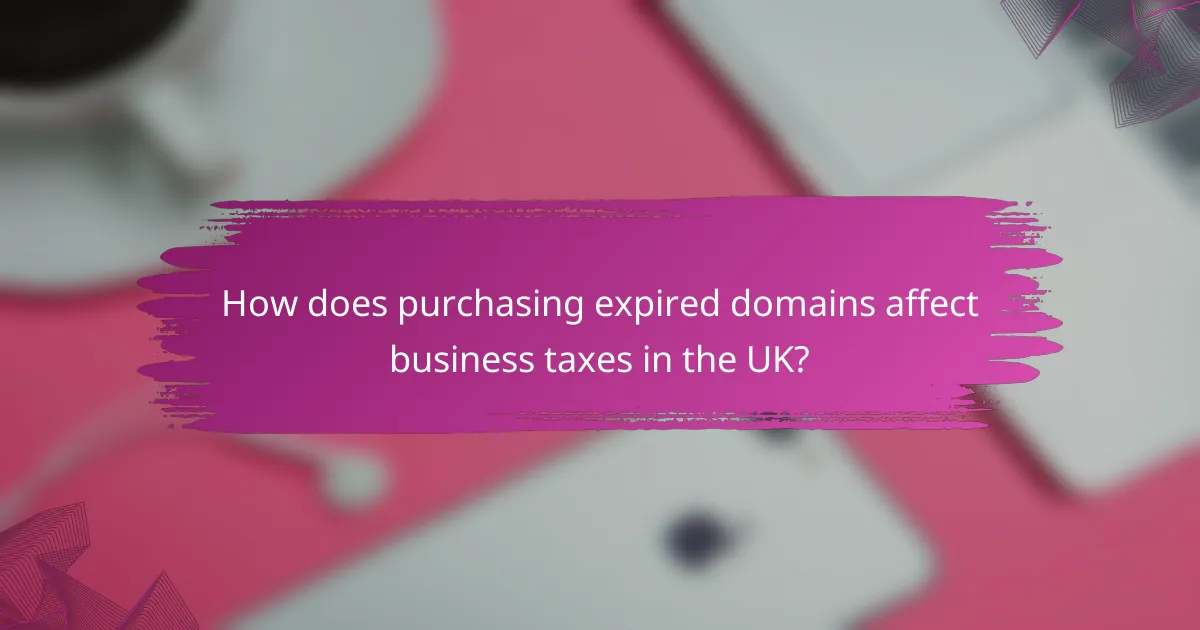
How does purchasing expired domains affect business taxes in the UK?
Purchasing expired domains can have significant implications for business taxes in the UK, particularly regarding taxable income and asset valuation. Understanding these effects is crucial for effective financial planning and compliance.
Impact on taxable income
When a business acquires an expired domain, the purchase cost can be treated as a deductible expense, potentially reducing taxable income. This means that if a domain is bought for several hundred pounds, that amount can be subtracted from the business’s revenue when calculating taxes.
However, it’s important to keep accurate records of the purchase and any associated costs, such as renewal fees or improvements made to the domain. Failing to document these expenses properly could lead to issues during tax assessments.
Effects on business asset valuation
Expired domains can be classified as intangible assets on a company’s balance sheet, affecting overall asset valuation. The value assigned to the domain should reflect its potential for generating revenue, which can fluctuate based on market demand and SEO performance.
Businesses should regularly assess the value of their domains, especially if they plan to sell them or use them as collateral. Proper valuation can enhance financial statements and provide a clearer picture of the company’s worth to investors or lenders.
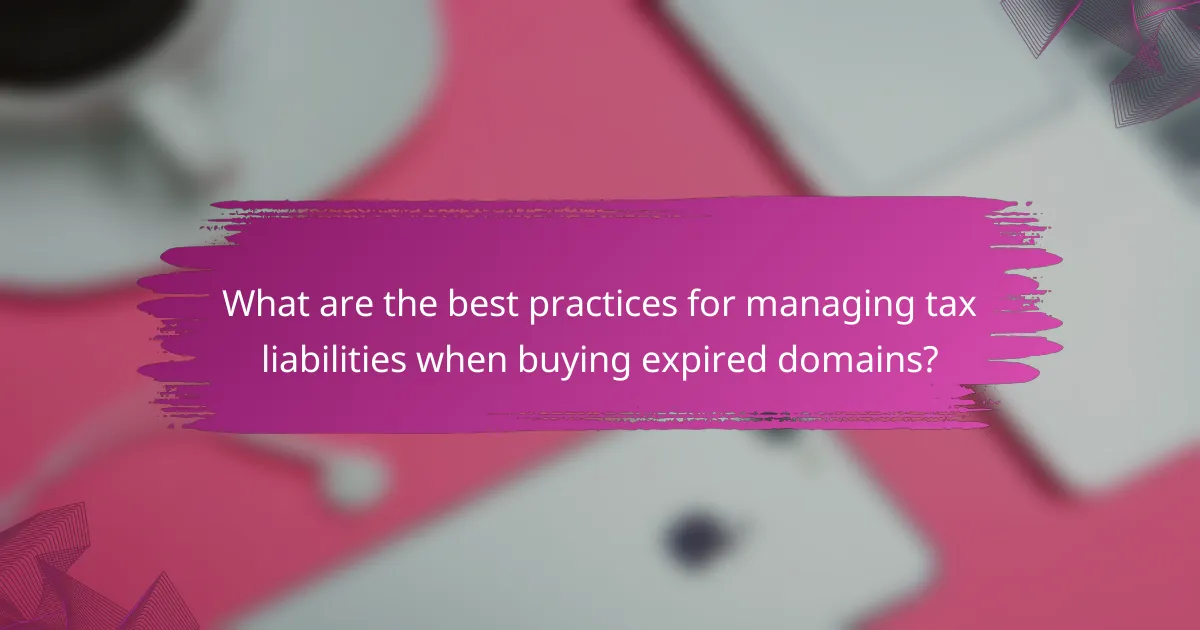
What are the best practices for managing tax liabilities when buying expired domains?
To effectively manage tax liabilities when purchasing expired domains in the UK, it is essential to understand the tax implications and maintain proper documentation. Engaging with tax professionals and keeping accurate records can help ensure compliance and optimize tax outcomes.
Consulting with tax professionals
Engaging a tax professional is crucial when buying expired domains, as they can provide tailored advice based on your specific circumstances. They can help clarify how the purchase may impact your tax obligations, including potential capital gains tax and VAT considerations.
Tax laws can be complex and subject to change, so regular consultations can help you stay informed about any new regulations that may affect your domain investments. This proactive approach can save you from costly mistakes down the line.
Maintaining accurate records
Keeping detailed records of all transactions related to expired domains is vital for managing tax liabilities. This includes invoices, purchase dates, and any associated costs such as renewal fees or transfer charges.
Consider using accounting software or spreadsheets to track these details systematically. Accurate records will not only simplify tax reporting but also provide evidence in case of an audit by HM Revenue and Customs (HMRC).
Understanding domain valuation methods
Understanding how to value expired domains is important for tax purposes, as it affects potential capital gains tax when you sell. Common valuation methods include comparing similar domain sales, assessing traffic metrics, and evaluating brandability.
Be aware that the valuation can fluctuate significantly based on market demand and trends. Keeping an eye on the domain market can help you make informed decisions about when to buy or sell, potentially maximizing your returns while managing tax implications effectively.
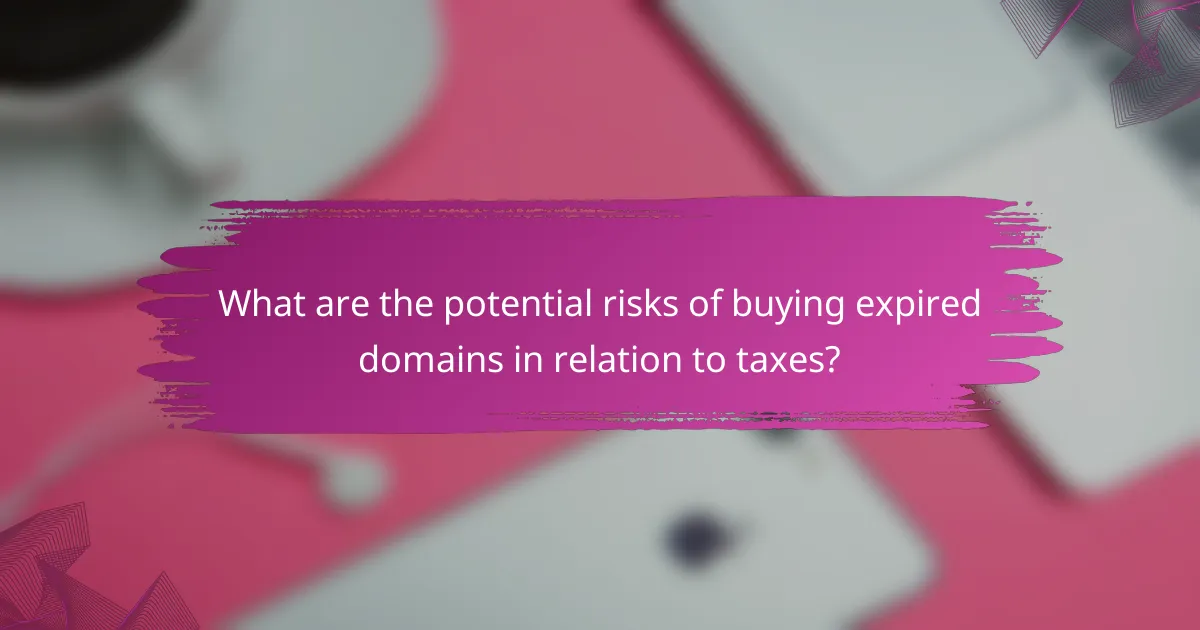
What are the potential risks of buying expired domains in relation to taxes?
Purchasing expired domains can lead to unexpected tax risks, particularly if the domain has a history of income generation or associated liabilities. Buyers should be aware of potential tax implications, including capital gains and income tax responsibilities.
Unforeseen tax liabilities
When acquiring an expired domain, it is crucial to investigate its past usage. If the domain previously generated revenue, you may be liable for taxes on that income, even if you did not own it at the time. Additionally, if the domain was linked to a business that had outstanding tax obligations, you could inherit those liabilities.
To mitigate these risks, conduct thorough due diligence. Check the domain’s history using tools like Wayback Machine or domain history services to uncover any previous ownership issues. Consulting with a tax professional can also provide clarity on potential liabilities.
Legal implications of domain ownership
Owning an expired domain can come with legal challenges, especially if the domain name is similar to a trademarked brand. If the previous owner faced legal issues, you might find yourself entangled in disputes or litigation. This could lead to costly legal fees and potential loss of the domain.
To avoid these pitfalls, perform a trademark search before purchasing. Ensure that the domain does not infringe on existing trademarks or copyrights. Seeking legal advice can help you navigate these complexities and protect your investment.
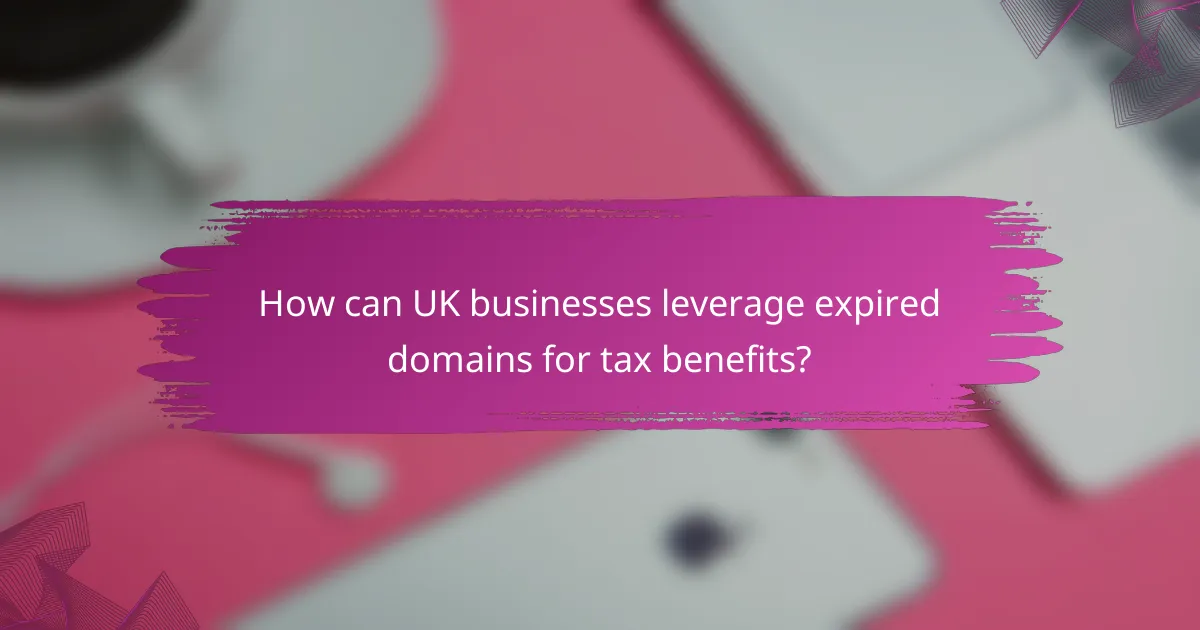
How can UK businesses leverage expired domains for tax benefits?
UK businesses can leverage expired domains to enhance their online presence and potentially gain tax advantages through brand expansion and passive income generation. By strategically acquiring these domains, companies can improve their market reach while considering the associated tax implications.
Using domains for brand expansion
Acquiring expired domains can significantly aid in brand expansion by providing established web traffic and backlinks. This can enhance a company’s visibility and credibility in its industry, leading to increased customer engagement and sales.
When selecting expired domains, look for those with relevant keywords and a history of good performance. This can help in redirecting traffic to your main site, thus boosting your brand’s online footprint without substantial marketing costs.
Generating passive income through domain leasing
Businesses can generate passive income by leasing expired domains to other companies. This can be a lucrative strategy, especially if the domain has high traffic or is in a desirable niche.
To maximize income, consider setting competitive leasing rates based on the domain’s potential value and traffic history. Ensure that any agreements are clear regarding usage rights and responsibilities to avoid disputes.
